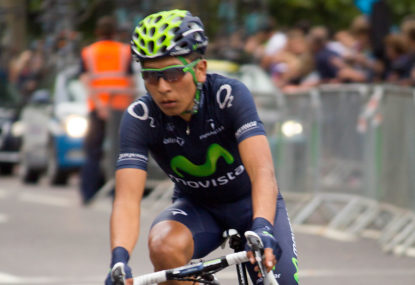'I've just won a stage of the Tour de France, mate!': Hindley grabs yellow jersey as Aussie blows Tour apart
Australia's Jai Hindley has said he is "lost for words" after a shock stage victory at the Tour de France earned him the leader's…

Chris Froome has all but won the 2015 Tour de France but the rider sneaking the column inches away from him today is Nairo Quintana.
The Colombian forcefully injected some real drama into the proceedings with his attacks on both the Col de la Croix de Fer and Alpe d’Huez, reminding us of the glory days of the 80s when his countrymen used to dance up the high mountains in similar fashion.
Ultimately however it was not to be. The attack on the Croix de Fer came too late in my opinion, and once Froome caught back on you knew that nobody in this year’s race was going to claw back over two minutes on him.
“We designed a strategy from far out,” explained the Movistar leader. “We attacked on the Croix de Fer but we could not get away like we thought. It wasn’t to be and we gave it all in the final climb. The Plan B was Alpe d’Huez. We took back a little bit of time but it wasn’t enough to win the Tour. The whole climb was marvellous. I always give it my best.”
There’s no doubt that Quintana had the best legs out there among the GC contenders so why not take a chance and attack on the very first inclines, right after Saint Jean de Maurienne, at 25km into the stage? Hindsight is a wonderful and useless luxury of course, but Froome and Sky have been so effectively smothering the Tour this year that it would have taken something almost totally unexpected plus a bad day from the yellow jersey for Quintana to win.
2 minutes 38 seconds was just too much to gain on the 13km Alpe d’Huez, which, though not an easy climb, is not as brutal as many believe.
So where did Movistar lose the Tour, despite arguably having the strongest pairing at the race?
“I lost the Tour in the first week in Holland,” said Quintana after the race, “when we gave away this minute and a half in Zeeland. The team were caught in a crash that left us unprotected in the wind.”
While that time there is undeniably the same he is now behind Froome going into the final stage, the time lost in Zeeland was down to poor positioning and a bit of bad luck. It was in the Pyrenees where Quintana showed that he still has some tricks to learn. Naturally a better climber than Froome, he lost time there due to arriving at the Tour one or two per cent below prime condition.
This view is strengthened by Quintana taking back the chunks of time he did the past two days. Yes, he is more naturally suited to the Alps but where the other GC guys have looked ragged recently the Colombian will be riding into Paris today wishing for one or two more mountains to ride up. One more Alpe d’Huez and he’d have won the Tour.
Chris Froome will take great satisfaction at securing his second Tour title but he ventured into the darkness at this race and it is a journey that might well sour the victory ever so slightly. Being spat up and having urine hurled at you is deplorable, whatever the circumstances. The medieval treatment has come about due to Sky’s dominance and the fact that many people believe the British team’s dominance is down to more than highly effective training.
As a unit Sky were quite brilliant, with the individuals in the team swapping in and out as form dictated to ride collectively above themselves. Compare this to Astana, who despite bossing the Giro in May and sending what was supposedly their A team to the Tour, were a shadow of their former selves.
The truth about the doping issue however is that it will not be going away any time soon. We stand at a precipice. Either the sport steps up to embrace the fullest transparency possible, from within itself, via the teams, the riders individually, the UCI, race organisers and journalists, or we will continue to see riders doubted the way Froome has been.
I do not condone the treatment that Froome has suffered, yet to not question why it is happening is to take the easy way out. Froome himself has said he is open to physiological testing and should be commended if he goes through with it, but I personally feel every rider should be doing this as a matter of course.
Laurens Ten Dam is one rider who has recognised that he had to face up to doping rumors as a result of riding for Rabobank in the past, and do something to disprove them.
On his compelling blog on Strava he wrote:
“Last year I published a book with a Dutch journalist called Robin van der Kloor. He followed me for a season, he had access to my biological passport data and he travelled with me to races and training camps. He even shared everything with an anti-doping expert at a university. I wanted to show my fans and the Dutch public that not everyone was a cheater and that they could trust me.”
Great stuff, but he then he goes back to the old default setting, saying that “People shouldn’t just assume everyone who performs well is cheating.” Yet there again is the crux of it. We know that historically just about everyone who has ever done well in cycling was in fact cheating.
There are really no two ways around it. If however more riders – no, every rider – followed Ten Dam’s example we might just change our minds.